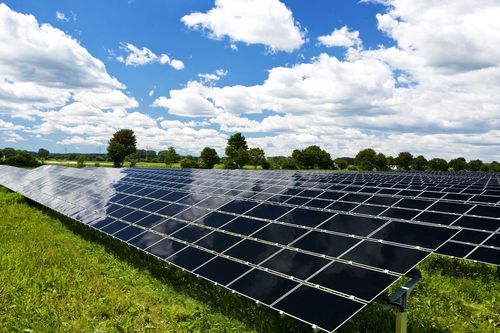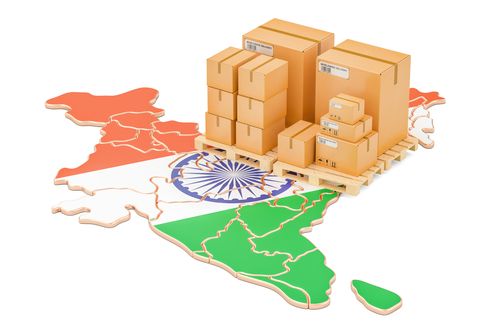Indian Oil has signed an investment contract worth around 2.7 billion euros
The state-owned Indian Oil Corporation (IOC) signed a corresponding contract for the investment of around 2.7 million euros at the beginning of June. Earlier, IOC announced the expansion of its Koyali crude oil refinery in Vadodara in the state of Gujarat. The refinery’s annual capacity is to be expanded from the current 4.3 million tons to 18 tons. Additional petrochemical plants will also be built for an annual production of 500,000 tons of polypropylene, as well as 235,000 tons of lubricating oil base stock.
Gujarat State Minister Rupani and Minister of State for Petroleum, Gas and Steel Pradhan were present at the signing of a memorandum of understanding between the Gujarat government and Indian Oil. The investment project “LuPech” will serve the production of lubricating oil base materials and polypropylene. Another project “Acrylics / Oxo Alcohol” is intended to produce butyl acrylate. Butyl acrylate is an important component of paints, coatings, adhesives, textile fibers, plasticizers and other similar products. The inclusion of petrochemical feedstocks is part of IOC’s new business strategy to develop other markets outside the oil and refining sector. Following completion of the butyl acrylate plants, IOC is planning additional projects for the production of PVC, styrene, acrylonitrile, PMMA and ethylene oxide.
In addition, Indian Oil Corporation has announced further MoUs for the construction of facilities at Dumad as part of the Koyali-Ahmednagar-Solapur petroleum pipeline and a tanker filling station for Linear Alkylbenzenesulfonic Acids (LABs), a basic ingredient in the detergent industry. Another major infrastructure project includes new gas flares at the Gujarat refinery and a hydrogen fueling station to operate fuel cell vehicles. According to IOC, the filling station will be the first of its kind in India and will operate under the Clean Fuel Campaign. The hydrogen will be used to fuel buses on the Vadodara to Kevadia route.
The Indian oil and gas industry is growing and offers good opportunities for your company to provide services and products there or to produce locally. However, most equipment, plants and facilities must undergo mandatory PESO certification. This is issued by the Petroleum and Explosives Safety Organisation of India. Relevant product groups or components include gas and pressure vessels, valves and fittings, or safety equipment. A complete list can be found on the page about PESO certification mandatory products. The experts at MPR International GmbH are available to answer your questions about PESO certification or other India certifications without obligation for an initial assessment.
If you are interested in understanding what requirements are needed for your product to be imported into India, please do not hesitate to contact us by email or phone at +49-69-271 37 69 261. There is no cost or obligation for us to check for you. If a certification need is discovered we can provide a quotation to make sure that all your certification needs are covered.
If you have any questions you can also use our chat-window in the bottom right. (Please check your browser settings if you can’t see the window)
For more information about PESO certification, please refer to our free brochure “PESO Certification Made Easy“.
Indian cabinet approves subsidy program for manufacturers of photovoltaic systems
The cabinet approved the subsidies amounting to the equivalent of 607 million US dollars in November 2020. The Ministry of Renewable and New Energy (MRNE), whose proposal for domestic manufacturing of photovoltaic modules was recently approved by the government and its subsidies are now available, will take care of the distribution of the funds. The subsidy program aims to build additional manufacturing capacity of 10,000 MW for photovoltaic systems. In particular, solar modules with high efficiency are to be promoted.

In a national plan, existing manufacturers are to be promoted and dependence on imports reduced. According to an article in the Business Standard, Adani Green, Azure Power, Vikram Solar and Waaree Solar are the leading solar module manufacturers in India. Goldman Sachs-backed renewable energy project developer ReNew Power recently announced its entry into solar cell manufacturing.
According to Waaree Group Managing Director Hitesh Doshi, the incentive program, which is tied to production numbers, will make India’s supply of photovoltaic equipment more self-sufficient and less dependent on imports. Although the subsidies will be available exclusively to domestic manufacturers, Doshi also sees an opportunity to export complete systems or components. Government funds are to be disbursed to manufacturers through a transparent application process. The subsidy period is five years and starts with the commissioning of the production facility and the proven sales of the solar modules. The amount of funding is also dependent on the efficiency of the solar modules and the proportion of materials and components from domestic suppliers.
India has set an ambitious target of 175 gigawatts of renewable energy capacity by 2022. This includes 100 GW from solar and 60 GW from wind. However, most of the current solar energy capacity of 32 GW comes from imported photovoltaic systems. Nearly 75 percent of India’s solar power is based on Chinese solar cells and modules. India’s current solar cell production capacity is 3 GW and 5 GW for modules. India awarded its first solar cell manufacturing tender earlier this year. Under this tender, Adani Green and Azure Power will manufacture solar cells and modules with a capacity of 2 GW and 1 GW, respectively.
The MNRE stated in a recent release that preference will be given to domestically produced solar modules in procurement by central government agencies. As part of the country’s current efforts to ban imports from China, the MNRE has also proposed a 20 percent punitive tariff on imports of solar cells and modules.
In India, photovoltaic systems, equipment and components are subject to BIS certification. BIS certification is similar to CE certification but with some important differences. BIS stands for the Bureau of Indian Standards and is India’s national certification body under the umbrella of India’s Ministry of Consumer Affairs, Food & Public Distribution. It is the central awarding body for BIS certification.
Since 2012, the BIS has been gradually expanding the certification catalog and continuously adding additional goods. BIS certification mandatory for many electronic products for industrial and consumer uses. Factory inspections are also required for some products.
If you are interested in understanding what requirements are needed for your product to be imported into India, please do not hesitate to contact us by email or phone at +49-69-271 37 69 261. There is no cost or obligation for us to check for you. If a certification need is discovered we can provide a quotation to make sure that all your certification needs are covered.
If you have any questions you can also use our chat-window in the bottom right. (Please check your browser settings if you can’t see the window)
For more information about BIS certification, please refer to our free brochure “BIS Certification Made Easy“.
Financial technology in India could reach a market value of up to 160 billion US dollars

Indian financial technology companies could more than triple in value over the next five years. With that, experts predict a valuation of between $150 billion and $160 billion in market value by 2025. This is according to a report on a joint study by the Boston Consulting Group and the Federation of Indian Chambers of Commerce and Industry (FICCI). The study examined the growth potential and the need for action for India’s financial technology industry.
According to the report, India is capable of adding between $150 billion and $160 billion in enterprise value to the financial technology sector by 2025. The experts foresee an increase in value creation of approximately US$100 billion. To achieve this goal, Indian financial technology firms will need investments of between $20 billion and $25 billion over the next five years, the report added.
Overall, India has more than 2,100 financial technology companies, 67 percent of which have emerged in the past five years. The current market value is estimated to be between $50 billion and $60 billion. The industry’s growth has been largely spared the negative impact of the Covid 19 pandemic.Since January 2020, India has seen the emergence of three Unicorn startups (more than $1 billion in capital) and five new Soonicorns (more than $500 million in capital).
Globally, mobile apps are becoming increasingly important in finance, whether professional users or end customers. Analysts see growth rates tripling between 2020 and 2027, with India playing an important role in the Asian region. The increasing popularity will also lead to higher demand for mobile devices such as smartphones and tablets in the respective growth markets. In India, numerous telecommunications products must undergo what is known as TEC certification before being sold or placed on the market. TEC is the abbreviation for Telecommunication Engineering Center, and the TEC is the competent authority in India for the certification of such products. More information about the mandatory TEC certification can be obtained without obligation from an expert of MPR International GmbH. We are pleased to answer your questions and to support your company with a TEC certification.
TEC certification has been around many years before 2019 as a voluntary certification, but since April 2019 the certification has been mandatory and every year the Telecommunication Engineering Center (TEC) expands the certification catalog and adds more telecom products. See the list of TEC standards here.If you are interested in understanding what requirements are needed for your product to be imported into India, please do not hesitate to contact us by email or phone at +49-69-271 37 69 261. There is no cost or obligation for us to check for you. If a certification need is discovered we can provide a quotation to make sure that all your certification needs are covered.
For more information about TEC certification, please refer to our free brochure “TEC Certification Made Easy“.
IMF sees India as fastest growing economy in fiscal 2022
The Indian economy is expected to grow by 11.5 percent in the coming fiscal year, according to IMF forecasts. With this, the International Monetary Fund (IMF) predicts a strong recovery for the subcontinent and following the drastic negative impact this year due to the Corona pandemic. As countries next in line to increase economic growth in 2021, the IMF lists China at 8.1 percent, followed by Spain (5.9 percent) and France (5.5 percent).

Regarding India, the IMF also revised its estimates for the current year from a decline in economic output of 10.3 percent in the October forecast to just 8 percent as of current data. In 2020, the IMF said China was the only major country to post positive economic growth at 2.3 percent. Next year, the IMF expects the Chinese economy to grow by 5.6 percent. If these current figures are taken into account, India is currently the fastest growing economy in the world.
The IMF’s report, published at the end of January 2021, includes other indicators of the global economy. For example, the IMF estimates that global trade volume will grow by 8 percent this year. The price of oil in 2021 will rise by about 20 percent above the already low level of 2020 but still remain below the average prices of 2019. As trade volumes increase and India becomes more involved in the global trade of goods, product certifications will become increasingly important.
The Indian certification landscape is very difficult to navigate with your different agencies and processes. Do you need or want to know more about AIS/TAC certification for automotive or BIS for electronic and other consumer products, TEC for telecom products, WPC for radio products, or PESO certification for gas or oil industry products? MPR International GmbH – has been assisting market leaders of numerous industries with their certification projects in Asian markets for many years. Thanks to our fast approach and excellent relationships in India, our customers can always meet their deadlines for the start of production or market launch in India. MPR International GmbH will be pleased to advise you regarding India certification and show you the necessary steps without obligation.
If you are interested in understanding what requirements are needed for your product to be imported into India, please do not hesitate to contact us by email or phone at +49-69-271 37 69 261. There is no cost or obligation for us to check for you. If a certification need is discovered we can provide a quotation to make sure that all your certification needs are covered.
If you have any questions you can also use our chat-window in the bottom right. (Please check your browser settings if you can’t see the window)
For more information, please refer to our free brochures:
AIS-Brochure
BIS-Brochure
TEC-Brochure
WPC-Brochure
PESO-Brochure



